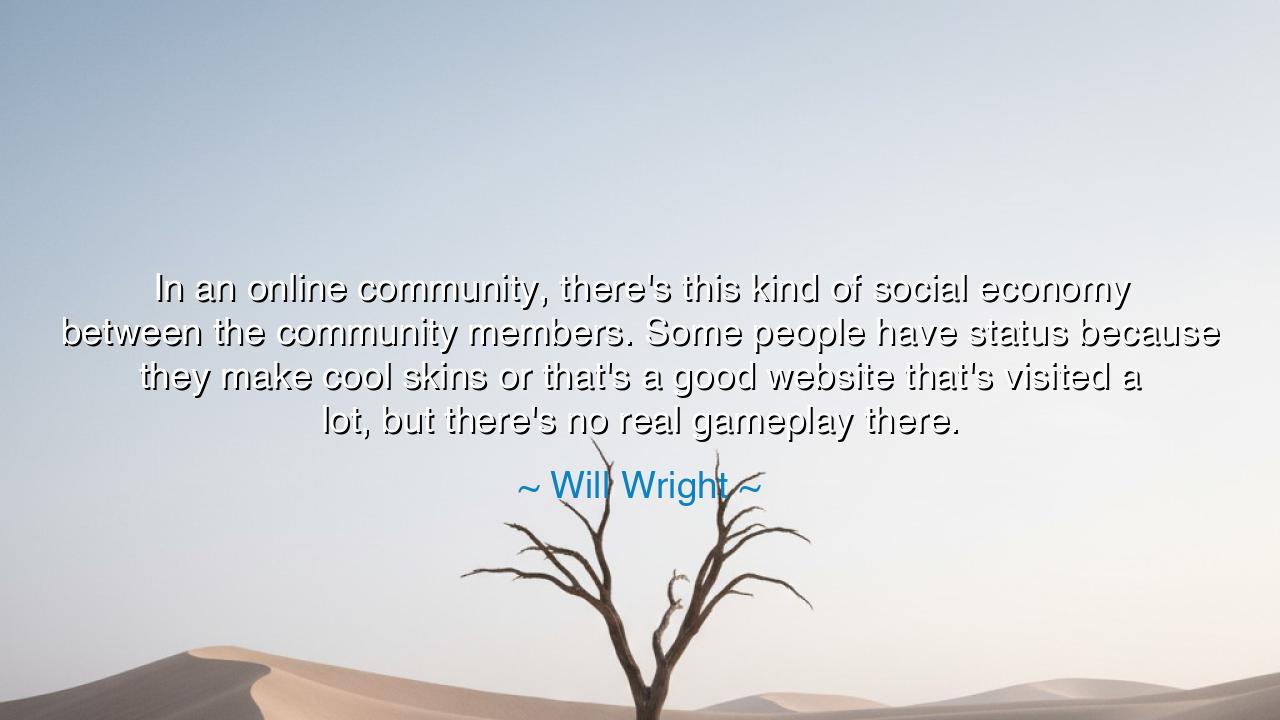
In an online community, there's this kind of social economy
In an online community, there's this kind of social economy between the community members. Some people have status because they make cool skins or that's a good website that's visited a lot, but there's no real gameplay there.






In the modern world, where virtual spaces have become as real and impactful as the physical world, Will Wright offers an insightful observation: "In an online community, there's this kind of social economy between the community members. Some people have status because they make cool skins or that's a good website that's visited a lot, but there's no real gameplay there." These words speak not only to the world of online gaming but also to the larger principles that govern our societies—how status, value, and purpose are often shaped by what others perceive, rather than by the deeper substance of a person’s contributions or actions.
The ancients understood that the status of an individual, or the prestige of a group, was not always tied to true virtue or real accomplishment, but often to the outward appearances that others valued. In ancient Greece, for example, Athens was a hub of intellectual achievement, but the status of its citizens was often linked to their public persona rather than their actual contributions to philosophy or the arts. Socrates, despite his profound wisdom, did not seek status; instead, he sought to engage people in deeper conversations about the true meaning of life. The Athenians admired those who contributed to public life with eloquence or wealth, while those who worked in the shadows, like Socrates, were often overlooked, despite their significant contributions.
Similarly, in the world of online communities, where individuals find their status not through physical prowess or noble deeds, but through their contributions to the digital landscape, there is a social economy of status that rewards those who provide appearance rather than substance. Gaming communities, for example, reward individuals who create visually impressive skins or high-traffic websites, but these contributions might lack true depth or meaning. Wright points out that the substance of what makes a community thrive—whether it is actual play, collaboration, or shared purpose—is often lost in the pursuit of superficial status.
Consider the rise of the Roman Empire, where much of its status and glory were built not on substance alone but on the grandeur of its architecture, its entertainment, and its military conquests. The Colosseum, for example, stood as a grand symbol of Rome's dominance, yet the spectacle of gladiatorial games, while awe-inspiring, did little to promote the true values of human dignity or philosophical growth. In the same way, while the online world can offer grand spectacles in the form of flashy websites or popular skins, these creations can distract from the true purpose of the community—whether it is shared learning, real interaction, or genuine collaboration.
The wisdom of Marcus Aurelius, the Stoic philosopher-emperor, serves as a powerful reminder to reflect on the substance behind our actions, rather than chasing status or appearance. In his writings, he often reflects on the transient nature of worldly achievements, reminding himself and others that true fulfillment comes not from the accolades of others, but from inner virtue and the quality of one’s work. Wright’s insight into online communities parallels this thinking, reminding us that, in the digital world, the real work lies not in the status we gain from appearances, but in the quality of our contributions—whether they are creative, intellectual, or collaborative.
This lesson is especially relevant in the digital age, where the ease of creating and sharing content can often lead to an overemphasis on visibility and popularity, at the cost of deeper meaning. The lesson from Wright’s words is not to dismiss the value of creating visually impressive or widely visited platforms, but to remind us that substance and real interaction should remain at the heart of any community. Just as the ancients valued wisdom and virtue above fleeting glory, so too must we seek to build communities that are not just outwardly impressive, but that encourage real connection, learning, and growth.
In our personal lives, we must ask ourselves: what is the true value of the contributions we make? Are we chasing status, or are we committed to making a lasting impact based on our skills, passion, and purpose? Whether in the realm of online communities, professional endeavors, or personal relationships, it is essential to remember that authenticity, meaning, and substance should always take precedence over mere appearances. Let us strive to be individuals who contribute not only in ways that are seen and recognized, but in ways that make a real difference, ensuring that the communities we build—both digital and physical—thrive on true values and shared purpose.






AAdministratorAdministrator
Welcome, honored guests. Please leave a comment, we will respond soon